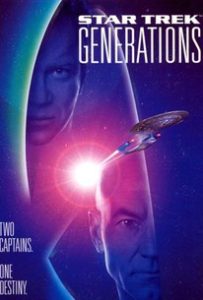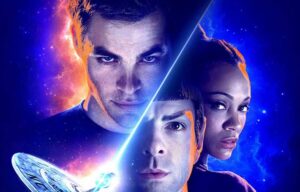 This is a continuation of my article “To Boldy Film What No Man Has Filmed Before,” which covered the first six Star Trek movies starring the original cast. Those films ended an era that will never return, but Star Trek itself lives on with a new generation and a new crew that has become as beloved as the original.
This is a continuation of my article “To Boldy Film What No Man Has Filmed Before,” which covered the first six Star Trek movies starring the original cast. Those films ended an era that will never return, but Star Trek itself lives on with a new generation and a new crew that has become as beloved as the original.
I will continue with the numbering scheme I began in the first article with the first six movies to continue the exploration of the odd-numbered curse. To see if it holds up with these new films.
Star Trek the Motion Picture did well enough, in spite of its dismal story, to not only spawn a sequel, but a new Star Trek series. This was a reboot of a franchise, but not like the reboots of today. This was a reboot like reboots should be done. They jumped a century into the future and came up with the next generation of Starfleet ships and officers, thereby preserving all that Star Trek was in the previous series while providing something fresh.
They provided a new kind of captain with revered Shakespearian actor Patrick Stewart playing Jean-Luc Picard, the opposite of flamboyant, impulsive James T. Kirk. They provided a new kind of unemotional character to replace Spock in the form of android Data. They expanded the diversity of the original cast to not only include humans of multiple races, but multiple species as well, including their one-time mortal enemies the Klingons. And they provided a shiny new look to the milieu of the Federation with new technology, as would be natural a century into the future.
With that came a new set of movies, transitioning on from where the original movies left off in the same way as The Next Generation transitions on from the original series. With one big exception.
7. Star Trek Generations
Already we discover a new spirit to the movie in its opening theme: subdued and nuanced like Captain Picard, compared to the themes with Kirk, reflecting his flamboyance. But unlike the two TV series, where the gap between the first and the second was bridged by virtually nothing but many years, this movie transitions more gradually from one cast to the next.
The first episode of Star Trek: The Next Generation made a small nod to the original series to bridge the gap with a cameo from Dr. McCoy, but other than that, it was an abrupt, jarring transition. Not so with Generations. The transition was an integral part of the story. We begin with a small representation of the original crew in a short prolog, then segue into the new generation, dragging only one of those original characters into the rest of the film. The title “Generations” beats us over the head with the fact that this is a transitional story.
Certainly entertaining, certainly fresh with faces that were both new on the silver screen but comfortably familiar from the small screen, it wasn’t an awful film. And it continued the trend of big names in the cast with Malcolm McDowell, Alan Ruck of Ferris Bueller fame, and of course Whoopi Goldberg who landed a role on the TV series.
But alas, the odd-number curse still thrives with #7. The story is full of plot holes, forced plot points, and pure nonsense: e.g. the “echo” of Guinan in the Nexus conversing with Picard. The whole concept of the Nexus belongs more in Hindu mythology or an LSD acid trip than in science fiction—a strip of energy that grabs you up and lets you live a hallucinatory life of bliss.
Its greatest sin—and it’s a huge one—is the pathetic death it gives James Tiberius Kirk, one of the most heroic and iconic characters of all time. Oh, it sounds epic on paper, saving a planet with millions of lives, but he just slugged it out with a mediocre bad guy and fell down a cliff. It had all the satisfying closure of the finale of the series Dexter, namely none. Worse than none. Infuriatingly disappointing.
Generations doesn’t approach awful, but it’s certainly a lesser installment in the franchise, preserving the curse of the odd numbers. It’s criminal that the Star Trek creative team couldn’t put in the effort to make the Next Generation debut something amazing. After the maturity of Undiscovered Country, this was like going back to the kiddie days of glorified TV episodes.
8. Star Trek First Contact
This is it, boys and girls! This is the best incarnation of the entire Star Trek franchise. It’s no accident that its topic is the same one as the best incarnation of the entire Star Trek television franchise with “Best of Both Worlds”: the Borg.
The Borg is one of the most ingenious, terrifying antagonists ever conceived by the human creative mind. Relentless, unstoppable, they are a masterpiece of villainy. They are the Terminator times a bazillion. I’ll save for another day the story of how Star Trek squandered this fantastic villain into a feel-good mishmash, and speak only now of how bringing the Borg to the big screen was an epic move.
Too bad it requires the half-silly motif of time-travel-on-demand as concocted for Star Trek. Too bad its set-up is rushed and unsatisfying and therefore not especially believable. But once the necessary housekeeping is dealt with and we launch into the story, greatness ensues. It’s a moody, noir, haunted house theme with the Borg as the spooks. It’s Star Trek’s answer to Alien. But it didn’t stop there. Just to make things really slick, they added Zefram Cockran’s maiden warp drive flight and first contact with the Vulcans that was the seed that blossomed into the Federation. And gave Geordi blue eyes. Blue eyes on a black guy! I love it!
This film continued the pattern of star power names appearing in Star Trek, a testament to the relevance of science fiction if there ever was one. James Cromwell as eccentric Zefran (a far cry from how Cochran was portrayed in an episode of the orginal series), Alfre Woodard, and Alice Krige in a chilling and masterful performance as the Borg queen—a surprising twist that echoes the twist in the movie Aliens with the reveal of the alien queen.
There are always plot holes in Star Trek stories, major and/or minor, but the ones in First Contact are very much forgivable with the large scale drama mixed with human moments mixed with inspiring optimism for the future of the human species in this best of all the movie incarnations of Star Trek, and the first one exclusively focused on the Next Generation cast.
9. Star Trek Insurrection
On the heels of the best Star Trek film comes the worst Star Trek film. Clearly the creative team shot its wad with First Contact, and now they’re burned out completely. Unlike all the movies previous to this one, I’ve only watched it once and can barely remember the plot, but I can sure remember the nasty taste it left in my mouth after watching it that one time.
You’d think having Data go berserk and rebel would be a premise fraught with potential, but it turned out to be a real snoozer. Even stretching fake skin over the face of Oscar winner F. Murray Abraham couldn’t salvage it. After seeing the Borg threaten the very existence of humans in First Contact, the silly “Evil has a new face” slogan playing off the ridiculous skin mask just didn’t cut it.
Insurrection makes The Search for Spock look good and The Final Frontier even better. It’s the worst Star Trek since, “Brain and brain! What is brain?” All the efforts to present sweet moments for the characters fail to redeem it. Franchise bigwigs Rick Berman and Michael Pillar wrote it—they should have stuck to their executive roles. All of which means Insurrection promulgates the curse of odd-numbered Star Treks.
10. Star Trek Nemesis
It’s the tenth film, an even number, so it’s gonna be great, right?
To the shock and horror of us all, it’s the first film to break out of the curse of the odd numbered films. But in the wrong way! Instead of being an odd-numbered film that’s good, it’s an even-numbered film that sucks.
Nemesis was so bad, so unmemorable, that I literally had to refer to Wikipedia to remind myself of the plot. So many intriguing plot elements were tossed into it that it’s shocking it turned out so bad. A cloned young version of Picard, Riker and Deanna Troi finally getting married, Romulans rearing their Vulcanesque heads once again, casting Tom Hardy and Ron Perlman and Kate Mulgrew as Admiral Janeway who as Voyager captain made it back from the Delta quadrant in the nick of time to be promoted and make a gimmicky appearance in this last of the Next Generation films.
Put together by a master craftsman, these ingredients might have gelled into a compelling story, but no, it’s a mishmash that doesn’t work. It’s hard to say whether Insurrection or Nemesis is worse, mostly because I care so little for either film, I don’t want to bother figuring it out. They’re both a huge letdown after First Contact, and I only know that it’s a historic tragedy that this towering wonder of a franchise ends in such a pathetic two-movie whimper. These two finale films that end the era of the Next Generation rank right up there with the dismal final seasons of Lost, Dexter, House of Cards, and Game of Thrones.
With this film and the mediocre Voyager and Enterprise series, Star Trek comes to an end once more, with no shining light of hope on the horizon. The fans and the conventions and the passions will rage on, but Star Trek itself goes dark, with no more performances scheduled.
 Until the day Vulcan blows up…
Until the day Vulcan blows up…
I’d have to check with you here. Which is not something I usually do! I enjoy reading a post that will make people think. Also, thanks for allowing me to comment!